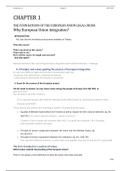Week 8: Financial statement analysis
Bookkeeping and Financial Accounting definition
Bookkeeping can be defined as day to day keeping of accounting records and transactions in an
accepted accounting standard while Accounting deals with putting together data kept in
bookkeeping to meaningful reports through financial statements such as Comprehensive Income
Statements, Comprehensive Financial Position and Statements of Changes in Equity as well as Cash
flow statements. Hence Accounting goes further beyond bookkeeping.
Users of financial statements
• Customers
• Suppliers
• Employees
• Lenders including banks
• Government
• Investors and potential investors
Financial statement analysis
-Financial analysis is a process of selecting, evaluating, and interpreting financial data, along
with other pertinent information, in order to formulate an assessment of a company’s present
and future financial condition and performance.
-The statement of comprehensive income and the statement of financial position is the starting
point for the management of a business to make calculations and projections and to make
strategic decisions based on such information. With calculations and projections being made,
it’s advisable that analysis is been made as per each category and be fully understood, as per
that represented category.
Common size-analysis
-Horizontal common-size analysis uses the amounts in accounts in a specified year as the base,
and subsequent years’ amounts are stated as a percentage of the base value. This method is
useful when comparing growth of different accounts over time.
-Vertical common-size analysis uses the aggregate value in a financial statement for a given year
as the base, and each account’s amount is restated as a percentage of the aggregate.
, Different categories of ratios
Profitability ratios - Profitability ratios are a class of financial metrics that are used to
assess a business's ability to generate earnings relative to its revenue, operating costs,
balance sheet assets, or shareholders' equity over time, using data from a specific point
in time.
Liquidity ratios -The liquidity ratios measure the ability of an entity to meet its short-
term obligations as they become due. Creditors and other lenders of monies they are
concerned about these ratios as they help to determine the probability of an entity to
meet its liabilities.
Gearing ratios -The gearing ratio is a financial ratio that compares some form of owner's
equity (or capital) to debt, or funds borrowed by the company. The gearing ratio is are a
measure of financial leverage that demonstrates the degree to which a firm's operations
are funded by equity capital versus debt financing.
Investment ratios- investment ratios are used to assess the performance of a company’s
shares, for example, price earnings ratio, earnings per share and earnings yield.
In addition to being of great interest to the ordinary shareholders, investment ratios are
also of interest to potential investors, analysts and competitors.
Financial statements analysis formulae
PROFITABILITY RATIOS
Gross profit margin on sales
𝐺𝑟𝑜𝑠𝑠 𝑝𝑟𝑜𝑓𝑖𝑡
x 100
𝑆𝑎𝑙𝑒𝑠
Net profit margin
𝑁𝑒𝑡 𝑃𝑟𝑜𝑓𝑖𝑡(𝑃𝑟𝑜𝑓𝑖𝑡 𝑎𝑓𝑡𝑒𝑟 𝑡𝑎𝑥)
x 100
𝑆𝑎𝑙𝑒𝑠
Bookkeeping and Financial Accounting definition
Bookkeeping can be defined as day to day keeping of accounting records and transactions in an
accepted accounting standard while Accounting deals with putting together data kept in
bookkeeping to meaningful reports through financial statements such as Comprehensive Income
Statements, Comprehensive Financial Position and Statements of Changes in Equity as well as Cash
flow statements. Hence Accounting goes further beyond bookkeeping.
Users of financial statements
• Customers
• Suppliers
• Employees
• Lenders including banks
• Government
• Investors and potential investors
Financial statement analysis
-Financial analysis is a process of selecting, evaluating, and interpreting financial data, along
with other pertinent information, in order to formulate an assessment of a company’s present
and future financial condition and performance.
-The statement of comprehensive income and the statement of financial position is the starting
point for the management of a business to make calculations and projections and to make
strategic decisions based on such information. With calculations and projections being made,
it’s advisable that analysis is been made as per each category and be fully understood, as per
that represented category.
Common size-analysis
-Horizontal common-size analysis uses the amounts in accounts in a specified year as the base,
and subsequent years’ amounts are stated as a percentage of the base value. This method is
useful when comparing growth of different accounts over time.
-Vertical common-size analysis uses the aggregate value in a financial statement for a given year
as the base, and each account’s amount is restated as a percentage of the aggregate.
, Different categories of ratios
Profitability ratios - Profitability ratios are a class of financial metrics that are used to
assess a business's ability to generate earnings relative to its revenue, operating costs,
balance sheet assets, or shareholders' equity over time, using data from a specific point
in time.
Liquidity ratios -The liquidity ratios measure the ability of an entity to meet its short-
term obligations as they become due. Creditors and other lenders of monies they are
concerned about these ratios as they help to determine the probability of an entity to
meet its liabilities.
Gearing ratios -The gearing ratio is a financial ratio that compares some form of owner's
equity (or capital) to debt, or funds borrowed by the company. The gearing ratio is are a
measure of financial leverage that demonstrates the degree to which a firm's operations
are funded by equity capital versus debt financing.
Investment ratios- investment ratios are used to assess the performance of a company’s
shares, for example, price earnings ratio, earnings per share and earnings yield.
In addition to being of great interest to the ordinary shareholders, investment ratios are
also of interest to potential investors, analysts and competitors.
Financial statements analysis formulae
PROFITABILITY RATIOS
Gross profit margin on sales
𝐺𝑟𝑜𝑠𝑠 𝑝𝑟𝑜𝑓𝑖𝑡
x 100
𝑆𝑎𝑙𝑒𝑠
Net profit margin
𝑁𝑒𝑡 𝑃𝑟𝑜𝑓𝑖𝑡(𝑃𝑟𝑜𝑓𝑖𝑡 𝑎𝑓𝑡𝑒𝑟 𝑡𝑎𝑥)
x 100
𝑆𝑎𝑙𝑒𝑠





